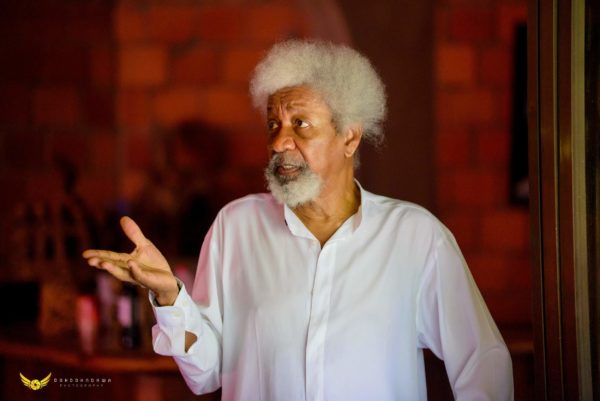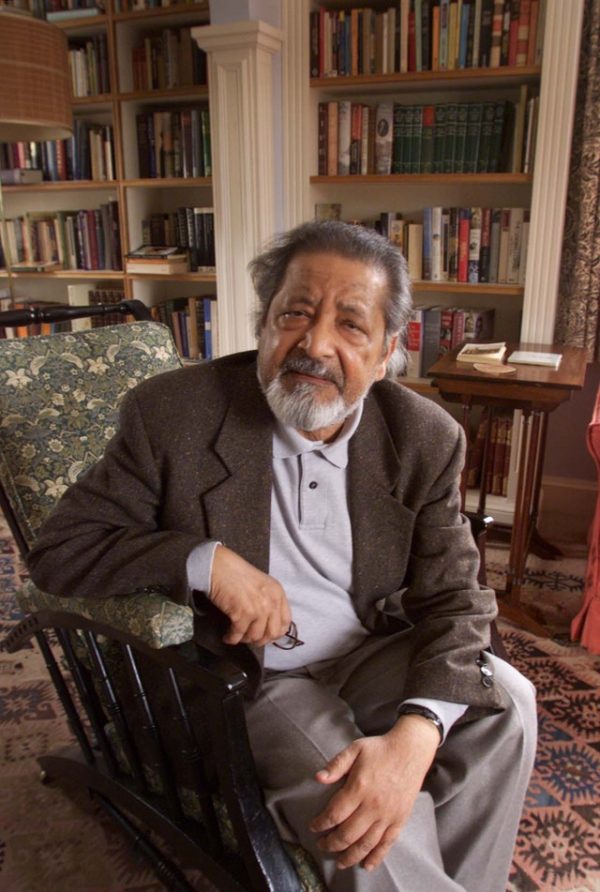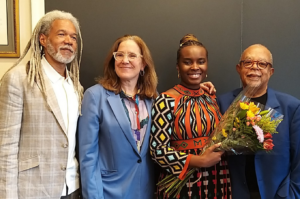
Following V.S. Naipaul’s passing two weeks ago, we ran a collection of the things that some of Africa’s leading thinkers—Chinua Achebe, Wole Soyinka, Chimamanda Ngozi Adichie, Aminatta Forna, Binyavanga Wainaina, Teju Cole, and Namwali Serpell—said about the man.
In 1986, after Wole Soyinka was awarded the Nobel Prize in Literature, VS Naipaul remarked: “Has he written anything?” Soyinka, he said, was “a marvellously establishment figure, actually,” and the Swedish Academy was “pissing on literature from a great height.” Even after Naipaul himself received the Nobel Prize in 2001, fifteen years after Soyinka, Pa Wole, as far as we know, never replied in public.
Until now.

In a new essay by Nigerian writer and linguist Kola Tubosun, about his visit to Soyinka’s art-filled house deep in a forest in Abeokuta, Soyinka grants him permission to publish a reply. An excerpt:
“I think I got everything that I need, except for one thing,” I said, when he returned. “VS Naipaul is dead. What do you think about that?”
“Ah, Naipaul is dead,” he repeated. I tried to picture him reacting to any of the snide remarks Naipaul had allegedly made about him, or about Africa, over the years. When Ṣóyínká won the Nobel Prize in 1986, Naipaul was reported to have said: “Has he written anything?”
Ṣóyínká’s body language didn’t betray any animosity. “Between you and me, I think he wrote one of the most beautiful novels ever written, A House for Mr Biswas,” he said. “Beautiful novel, and of course some of his other writings. But my immediate instinct the moment I heard the news was ‘Ah! The white race has lost a good writer.’” He said this with his usual mirth, but he had obviously given it some thought.
“Can I quote you on this?” I asked.
“Yes,” he responded, “because he suffered from self-hate. I couldn’t believe that a Jamaican…” (I assumed he meant Caribbean) “that one of us, [that] wrote such a beautiful book—that he could be so filled with self-hate and articulate it.”
When I added that Naipaul’s heritage was Indian too, he nodded his assent. “And the contempt which he had for African culture, and so on…he kept it up too; I thought he would mellow away from it…”
At the 100th anniversary of the Nobel Prize in 2001, Ṣóyínká was invited to participate as a past honoree. He declined to attend; “I told them I’m sorry but I just cannot come and celebrate there. I just couldn’t honestly celebrate with him. But I will always acknowledge that he’s a beautiful prose writer and that book was a classic.”
I told him I hadn’t read it. I had only read Miguel Street and Mystic Masseur. “Believe me,” he said, “there is nothing to beat Mr Biswas.”
Given that he had ignored him for three decades, we wouldn’t have bet on him ever replying in public. But this is as classy as it gets. Even with that bit of shade.









奈保尔笔下的非洲,更荒谬还是更真实 - 头条文章汇 July 17, 2022 20:22
[…] Ah! The White Race Has Lost a Good Writer | 32 Years Later, Wole Soyinka Finally Reacts to V.S. Naip… […]